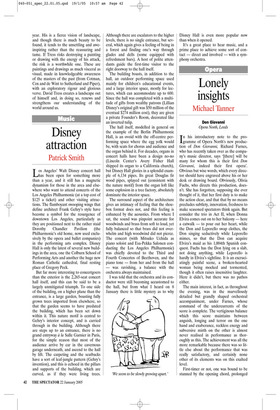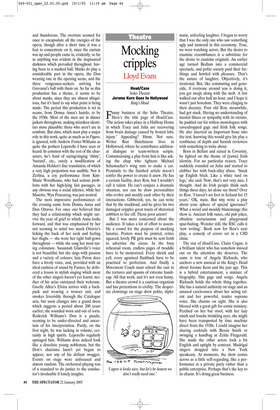Lonely insights
Michael Tanner
Don Giovanni Opera North, Leeds In his introductory note to the programme of Opera North’s new production of Don Giovanni, Richard Farnes, who has recently taken over as the company’s music director, says ‘[there] will be many for whom this is their first Don Giovanni, indeed their first opera’. Obvious but wise words, which every director should have engraved above his or her desk or drawing board. Obviously, Olivia Fuchs, who directs this production, doesn’t. She has forgotten, supposing she ever thought of it, that her first duty is to make the action clear, and that that by no means precludes subtlety, innovation, freshness to make seasoned spectators think again. But consider the trio in Act II, when Donna Elvira comes out on to her balcony — here a catwalk — to pour out her heart, while the Don and Leporello swap clothes, the Don singing seductively while Leporello mimes, so that the Don can acquire Elvira’s maid as his 1,004th Spanish conquest. Fuchs has the Don lying on a slab, not doing anything, while Leporello is hardly in Elvira’s sightline. It is an excruciatingly painful scene, a broken-hearted woman being mocked and tormented, though it often raises insensitive laughter. Here it didn’t, but there was no pathos either.
The main interest, in fact, as throughout the evening, was in the marvellously detailed but grandly shaped orchestral accompaniment, under Farnes, whose command of the undercurrents of the score is complete. The vertiginous balance which this score maintains between anguish, longing and terror on the one hand and exuberance, reckless energy and subversive mirth on the other is almost never realised in performance as thoroughly as this. The achievement was all the more remarkable because there was so little else about the performance that was really satisfactory, and certainly none other of its elements was on this exalted level.
First-timer or not, one was bound to be stunned by the opening chord, prolonged and thunderous. The overture seemed for once to encapsulate all the energies of the opera, though after a short time it was a feat to concentrate on it, since the curtain was up and people came in, evidently, so far as anything was evident in the inspissated darkness which prevailed throughout, having been to a masked ball. Masks do play a considerable part in the opera, the Don wearing one in the opening scene, and the three vengeance-seekers arriving for Giovanni’s ball with them on. So far as this production has a theme, it seems to be about masks, since they are almost ubiquitous, but it’s hard to say what point is being made. The period this production is set in seems, from Donna Anna’s hairdo, to be the 1930s. Most of the men are in dinner jackets throughout, making mistaken identities more plausible; those who aren’t are in combats. But class, which must play a major role in this work, quite as much as in Figaro, is ignored, with Andrew Foster-Williams as quite the poshest Leporello I have seen or heard. In common with the rest of the characters, he’s fond of saying/singing ‘shitty’, ‘bastard’, etc., surely a modification of Amanda Holden’s fine translation, of which a very high proportion was audible. Nor is Zerlina, a coy performance from KimMarie Woodhouse, who had serious problems with her high-lying fast passages, in any obvious way a social inferior, while her Masetto, Wyn Pencarreg, was just neutral.
The most impressive performances of the evening came from Donna Anna and Don Ottavio. For once one believed that they had a relationship which might survive the year of grief to which Anna looks forward, and that was emphasised by her not seeming to mind too much Ottavio’s licking the back of her neck and feeling her thighs — she wore her tight ball-gown throughout — while she sang her most taxing coloratura. Susannah Glanville’s voice is not beautiful, but she sings with passion and a variety of colours; Iain Paton does have a lovely voice, and, provided with an ideal cushion of sound by Farnes, he delivered a lesson in stylish singing which most of the other singers haven’t yet learnt; neither of his arias outstayed their welcome. Giselle Allen’s Elvira arrives with a backpack and wearing a trouser suit, and smokes feverishly through the Catalogue aria, but soon changes into a grand dress which suggests a period about 200 years earlier; she sounded worn and out of sorts. Roderick Williams’s Don is a puzzle, seeming to be under-directed and uncertain of his interpretation. Partly, on the first night, he was lacking in volume, certainly in high spirits. Leporello regularly upstaged him. Williams does indeed look like a dissolute young nobleman, but the Don’s charisma hasn’t yet begun to appear, nor any of his defiant swagger. Events on stage were unfocused and almost random. The orchestral playing was of a standard to do justice to the conductor’s invaluable if lonely insights.














































 Previous page
Previous page